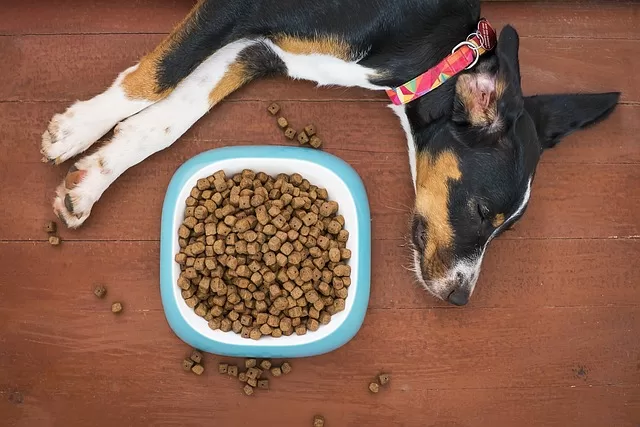This post contains affiliate links. See our Affiliate Disclosure Statement page for more details.
Table of Contents
Boxer Dog Sensitive Stomach – 5 Best Tips
Boxers are known for their active and playful nature, but unfortunately, they are also prone to digestive issues.
Boxers with sensitive stomachs often experience vomiting, diarrhea, and gas, making it challenging for their owners to find the right food to feed them.
This article provides you with the 5 best tips to feed your boxer with a sensitive stomach.
Boxer Dog Sensitive Stomach – 5 Best Tips for Feeding
- Understanding Boxers with Sensitive Stomachs
- Identifying Food Allergies and Intolerances
- Choosing the Right Food for Your Boxer
- Feeding Tips for Boxers with Sensitive Stomachs
- Sample Diet Plan for Boxers with Sensitive Stomachs
Understanding Boxer Dog Sensitive Stomach
Boxers are prone to digestive issues because of their sensitive digestive systems.
Boxers have a short and straight digestive tract that can cause food to move quickly through their system.
This quick movement of food can cause digestive issues and make them prone to vomiting and diarrhea.
One reason for their sensitive stomachs is their high sensitivity to certain foods, such as
- Grains
- Soy

Some veterinarians recommend feeding boxer dogs a diet that is free of these ingredients.
Boxer dogs are prone to certain gastrointestinal issues, that can contribute to their sensitive stomachs.
Boxer Dog Sensitive Stomach – Gastrointestinal Issues
- Food allergies and sensitivities
- Irritable Bowel Disease (IBD)
- IBD is a disease that causes chronic inflammation of the GI tract which can cause vomiting, diarrhea, and weight loss in your Boxer Dog.
- IBD requires a specific treatment plan developed by a veterinarian.
- Gastric Dilatation Volvulus (GDV)
- Also known as Bloat
- GDV is a life-threatening condition that requires immediate medical treatment from a veterinarian
- GDV occurs when the stomach fills with air and twists on itself. The twisted stomach cuts off blood flow to the stomach and other organs.
Sources:
Inflammatory Bowel Disease in Dogs, VCA Animal Hospitals, Llera, DVM, Williams, DVM, and Ward, DVM.
Gastric Dilatation Volvulus – American College of Veterinary Surgeons
For additional information on Irritable Bowel Disease and Gastric Dilatation Volvulus in Boxer dogs read our article –
Why is My Boxer Dog Not Eating? Understanding the Causes and Solutions
It’s important to work with a veterinarian to identify the underlying cause of a boxer dog’s digestive issues and develop an appropriate treatment plan.
To better understand the specific dietary needs of boxer dogs, a data table can be created to track their food intake and any associated digestive symptoms.
Example data table for tracking food Intake and digestive symptoms (diarrhea, vomiting, flatulence, etc.)
| Date | Food Type | Portion Size | Digestive Symptoms |
| 4/1/23 | Grain-free chicken and sweet potato kibble | 1 cup | No symptoms |
| 4/2/23 | Canned salmon and rice | 1/2 can | Vomiting |
| 4/3/23 | Homemade chicken and vegetable stew | 1 cup | Diarrhea |
If your Boxer has a sensitive stomach try feeding fresh food from Ollie. We suggest Turkey with Blueberries fresh food option and the Probiotic Chews.
Boxer Dog Sensitive Stomach – Identifying Food Allergies and Intolerances
The first step in feeding your Boxer with a sensitive stomach is to identify if they have any food allergies or intolerances.
The top 6 most common foods causing allergies in dogs are
- Beef
- Wheat
- Dairy Products
- Lamb
- Chicken Egg
- Soy
This data was collected from 15 different experimental studies across different continents.
Beef, Dairy Products, and Wheat accounted for almost 70% of the allergic responses in dogs.
Source:
Food Allergies – A Canine Review, Journal of Entomology and Zoology Studies, Bhagat, et. al, 2017
For additional information on food allergies in Boxer dogs, read our articles
6 Top Foods That Lead to Food Allergies in Your Boxer
7 Most Common Boxer Dog Allergies – Helping Your Boxer with Symptoms
Boxer Dog Sensitive Stomach – Elimination Diets
An elimination diet is a process of removing potential food allergens from a dog’s diet to determine which ingredients may be causing the sensitivity.
A typical elimination diet for Boxer dogs with sensitive stomachs may involve gradually introducing a limited-ingredient diet consisting of
- Novel Protein Source
- Novel Carbohydrate Source
**It is essential to work closely with a veterinarian to ensure the diet is nutritionally balanced and meets the individual needs of the dog.**
It is recommended to avoid feeding table scraps or any other food sources during the elimination period to prevent inaccurate results.
Below is a sample table for an elimination diet. This is only an example. Your veterinarian can provide an elimination table or tracker specific to your Boxer’s needs.
| Food Type | Week 1 | Week 2 | Week 3 | Week 4 |
| Novel Protein Source | Venison | Venison | Venison | Venison |
| Carbohydrate Source | Sweet Potato | Sweet Potato | Sweet Potato | Sweet Potato |
| Treats | Venison Jerky | Venison Jerky | Venison Jerky | Venison Jerky |
Sources:
Boxer Dogs Breeds and Facts, Rover.com
Identifying Food Allergies: The Veterinary Elimination Trial Diet, DVM 360, Seltzer, 2019
If you are looking for Pet Insurance for your Boxer to help defray the cost of your veterinary insurance visit Odie Pet Insurance for plan options
Boxer Dog Sensitive Stomach – Choosing The Right Foods For Your Boxer

Once you have identified your Boxer’s food allergies and intolerances, the next step is to choose the right food for them.
Look for high-quality dog food that contains limited ingredients and is free of common allergens.
Additionally, choose a dog food that contains prebiotics and probiotics to aid digestion.
Some dog food brands that are recommended for Boxers with sensitive stomachs include
One option is to choose a limited-ingredient diet that contains a single source of protein and is free from common allergens such as
- Wheat
- Soy
- Corn
Another option is to opt for a veterinary prescription diet that is specifically formulated for dogs with sensitive stomachs.
When selecting dog food, it’s important to carefully read the ingredient list and consider factors such as protein source, digestibility, and overall nutrient content.
The Table below is an example data table that could be used to compare different dog food options for Boxers with sensitive stomachs.
Boxer Dog Sensitive Stomach – Dog Food Proteins Comparison
| Brand | Protein Source | Digestibility | Allergen-Free | Nutrient Content |
| A | Chicken | High | No | Balanced |
| B | Salmon | Medium | Yes | High in omega-3 |
| C | Lamb | Low | No | High in fat |
| D | Duck | High | Yes | Low in carbs |
For Fresh and Frozen Sensitive Stomach and Skin Dog food try Just For Dogs Sensitive Skin & Stomach Variety Pack
Boxer Dog Sensitive Skin – Feeding Tips for Boxers With Sensitive Stomachs
Here are some tips on what to feed a boxer dog with a sensitive stomach:
- Choose a bland diet. A bland diet is often the best way to settle a dog’s stomach.
- Look for a food that is low in fat and high in fiber.
- You can also try adding some cooked pumpkin or rice to your dog’s food to help add bulk and nutrients.
- Avoid rich or fatty foods. Rich or fatty foods can irritate your dog’s stomach and make its symptoms worse.
- Avoid giving them table scraps, processed meats, or anything else that is high in fat.
- Feed your dog smaller meals more often. Smaller meals are easier for your dog’s stomach to digest than larger meals.
- Try feeding your dog two or three smaller meals a day instead of one or two large meals.
- Make sure your dog has access to fresh water at all times. Dehydration can worsen stomach problems, so it’s important to make sure your dog is drinking plenty of fluids.
If your dog’s symptoms are severe, talk to your veterinarian. If your dog is vomiting or having diarrhea for more than 24 hours, or if they are lethargic or has a fever, it’s important to take them to the vet. Your vet can help you to determine the cause of your dog’s stomach problems and recommend a treatment plan.
It is important to note that every dog is different and what works for one dog may not work for another. If you are unsure about what to feed your boxer dog with a sensitive stomach, it is always best to talk to your veterinarian.
If your Boxer needs medication or other pet supplies to help with their sensitive stomach, we recommend Pet Care Rx they have a wide selection of products, quick delivery and great customer service.
Save an Extra 25% OFF Sitewide + Enjoy Free Standard Shipping on orders $48+ only at PetCareRx.com! Use Code: CARE25Boxer Dog Sensitive Stomach – Process for Feeding a Boxer Dog with a Sensitive Stomach
Feeding a Boxer dog with a sensitive stomach requires a careful approach to ensure that their nutritional needs are met while minimizing digestive upset.
Below is the process for feeding a Boxer dog with a sensitive stomach:
- Consult with a veterinarian
- Before making any dietary changes to your Boxer’s diet, it is important to consult with a veterinarian.
- The vet can diagnose any underlying health issues and provide recommendations for a suitable diet.
- Choose a high-quality dog food
- Look for high-quality dog food that is specifically designed for dogs with sensitive stomachs.
- These foods are typically formulated with easily digestible ingredients, such as rice or chicken.
- Introduce new food gradually
- When transitioning to a new food, it is important to do so gradually to avoid digestive upset.
- Start by mixing a small amount of the new food with your dog’s old food and gradually increase the amount of new food over several days.
- Feed smaller, more frequent meals
- Feeding your Boxer smaller, more frequent meals can help to prevent digestive upset.
- Aim to feed your dog at least two meals per day.
- Avoid table scraps
- Human food can be difficult for dogs to digest, especially those with sensitive stomachs.
- Avoid giving your Boxer table scraps or other human food.
- Monitor for digestive issues
- Keep a close eye on your Boxer’s digestive health, and if you notice any issues, such as vomiting, diarrhea, or lethargy, contact your veterinarian.
- Provide plenty of fresh water
- Make sure your Boxer always has access to fresh water, as dehydration can exacerbate digestive issues.
- Consider Supplements
- Certain supplements, such as probiotics or digestive enzymes, may be helpful for dogs with sensitive stomachs.
- However, it is important to consult with a veterinarian before giving your Boxer any supplements.
By following these steps, you can help to ensure that your Boxer with a sensitive stomach receives the proper nutrition while minimizing digestive upset.
Boxer Dog Sensitive Stomach – Sample Diet Plan for Boxer Dog Sensitive Stomach

Mashed Sweet Potatoes
Below is a sample diet plan for Boxers with sensitive stomachs:
- Breakfast: 1/2 cup of high-quality dog food
- Mid-morning snack: 1/4 cup of cooked sweet potato
- Lunch: 1/2 cup of high-quality dog food
- Mid-afternoon snack: 1/4 cup of boiled chicken
- Dinner: 1/2 cup of high-quality dog food
- Evening snack: 1/4 cup of cooked carrots
Listed below are two additional sample diets for Boxer Dogs with Sensitive Stomachs.
Diet 1:
- A high-quality limited-ingredient dry dog food that contains a single source of protein such as salmon, lamb or chicken, and a single source of carbohydrate such as brown rice or sweet potato.
- A small amount of cooked, plain chicken or turkey as a treat.
- Fresh vegetables such as green beans or carrots for added fiber and vitamins.
- Probiotic supplements to support digestion.
- Fresh water available at all times.
Diet 2:
- A homemade diet consisting of boiled chicken or turkey, brown rice, and steamed vegetables such as carrots, green beans, and spinach.
- A small amount of pumpkin puree for added fiber.
- A limited-ingredient wet dog food as a supplement for additional nutrition.
- Fresh water is available at all times.
We recommend consulting your veterinarian before feeding your Boxer a new diet to ensure they approve and it meets the nutritional needs of your Boxer Dog.
Boxer Dog Sensitive Stomach – Conclusion
Feeding a Boxer with a sensitive stomach requires patience and understanding.
Identifying food allergies and intolerances and choosing the right food can help alleviate their digestive issues.
Additionally, feeding smaller, more frequent meals and avoiding table scraps can also help.
By following these tips and tricks, you can keep your Boxer healthy and happy for years to come.

Discoverboxerdogs.com are Mary and Chris Kustanbauter. We reside in Red Lion, PA with our two Boxers, Duke and Katie, who are both rescue dogs. We have been working with Adopt A Boxer Rescue for the past 17 years and have adopted 5 Boxers from this fine organization. To learn more visit our Home, About Us, and Blogs Visit us on social media on Facebook – All About Boxers, Instagram, and Pinterest.


